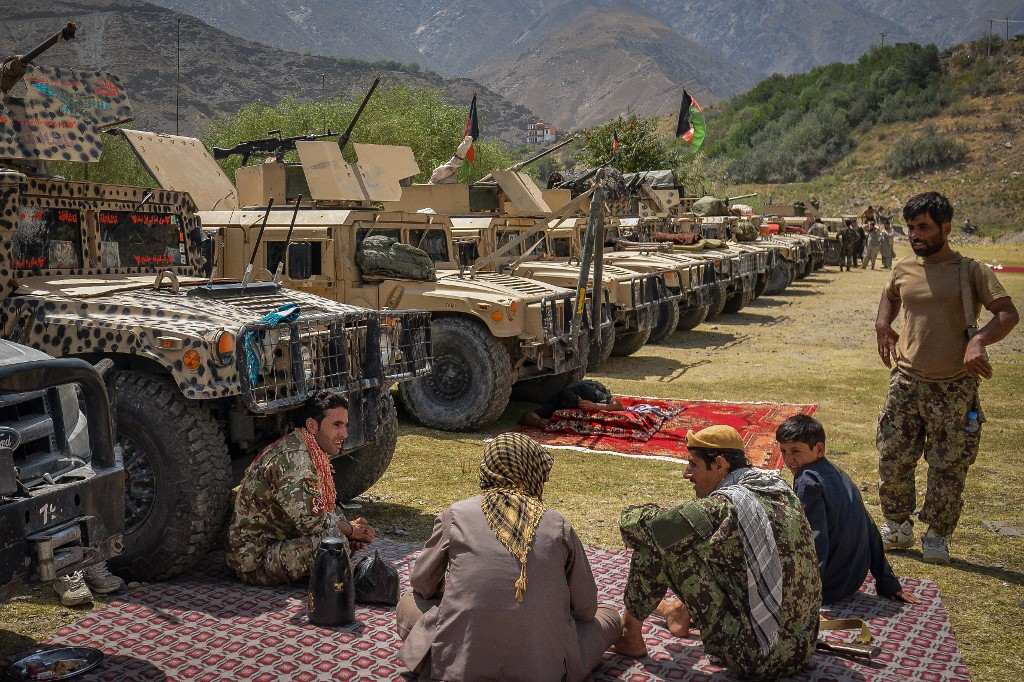Popular Reads
Top Results
Can't find what you're looking for?
View all search resultsPopular Reads
Top Results
Can't find what you're looking for?
View all search resultsRI terrorism risk ‘fairly low’ after Taliban victory: IPAC
The Jakarta-based think tank has concluded that the risk of terrorist attacks by Al-Qaeda in Southeast Asia is fairly low, at least in the short term, while noting that remnants of the dismantled Islamic State (IS) group could pose a greater threat.
Change text size
Gift Premium Articles
to Anyone
A
recent report by the Institute for Policy Analysis of Conflict (IPAC) has found that the risk of terror attacks in Indonesia – and Southeast Asia more broadly – after the recent Taliban victory in Afghanistan is “fairly low” but still cause for concern.
The Jakarta-based think tank concluded in its latest assessment that terrorist attacks by Al-Qaeda in the region were unlikely, at least in the short term, while noting that remnants of the dismantled Islamic State (IS) group could pose a greater threat.
Al-Qaeda, a militant multinational terrorist network operating out of Afghanistan, was responsible for the Sept. 11, 2001, terror attacks in the United States under the leadership of Osama bin Laden.
IS, meanwhile, is a rival group to Al-Qaeda that emerged in the wake of the 2003 US invasion of Iraq and gained global prominence in 2014 after driving security forces out of Western Iraq in a campaign to set up a caliphate.
IPAC’s report noted that as of this year, 40 schools affiliated with Jemaah Islamiyah (JI) remained. The group was responsible for the 2002 Bali bombings and several other major terror attacks in Indonesia in the 2000s.
Students of these schools who pass the recruitment process are poised to become fighters and eventually join JI’s military training program.
But while the group was still actively recruiting, IPAC researchers said, JI had shown little interest in attacks, although it remained committed to military training for its members.
The report noted that any new Al-Qaeda camps for foreign fighters would be cause for concern and that a more militant splinter, angered by arrests of extremists and inspired by the Taliban’s success, could still emerge despite a high level of police vigilance.
“All indications are that in the short term, JI does not pose a significant threat,” said IPAC director Sana Jaffrey in a statement.
“This is an organization that has shown extraordinary resilience, and whether inspired by the Taliban or its own sense of history, we are likely to see regeneration. No one should rule it out,” she added.
Soon after a few dozen Indonesian citizens were airlifted out of the Kabul airport late last month, Foreign Minister Retno LP Marsudi headed to Doha to meet with the Taliban leadership, who were involved in peace talks mediated by Qatar.
The minister cautioned the new leaders that Afghanistan must not become a “breeding ground for terrorist organizations and activities”. The Taliban had just managed a surprising, nearly bloodless takeover of Afghanistan sparked by the US decision to withdraw all its troops from the country.
Concerns in Indonesia have been growing over the possibility of new threats from homegrown terrorist groups likely to have been emboldened by the Taliban’s swift rise to power.
These concerns were exacerbated by IS-linked attacks just outside of the Kabul airport, apparently targeting people seeking to flee the country, mere hours after Retno’s Doha meeting.
Afghanistan was one of the countries where JI members received paramilitary combat training. In the 1990s, JI also received funding from Al-Qaeda.
The Taliban is often described as a militant group, and many of its members, including those who hold positions in the current interim government, are still on United Nations sanctions lists.
However, since 2011, the UN Security Council has acknowledged that the group is separate from Al-Qaeda, whose political ideology was transnational in nature and posed a greater threat to other countries. The Taliban are also not on the US-designated list of foreign terrorist organizations (FTOs).
In the US-Taliban agreement signed in February of last year, the Taliban promised to undertake unspecified counterterrorism efforts in return for the full withdrawal of US and international military forces.
Over the past few years, Indonesian authorities have cracked down on and nearly dismantled JI, but the group is still recruiting new members through dakwah (religious outreach) and educational programs.
Recently, National Police counterterrorism squad Densus 88 arrested four JI members in Bekasi, West Java, including Abu Rusydan, a senior JI figure who was jailed for three and a half years in 2004.
The group currently has 1,600 active members nationwide, according to a police statement, about a quarter of IPAC’s estimated 6,000 members as of July 2019, when Para Widjayanto, the group’s former leader, was arrested.
The IPAC report notes that the last direct communication between JI and Al-Qaeda leadership took place in Bangkok in 2010, when JI rejected an offer to work together against targets in Southeast Asia.
“If JI wanted to reopen channels of communication with Al-Qaeda, it could probably do so, given that it still has some cadres abroad. Its likely priority, however, will be rebuilding at home. The pro-IS groups remain the ones to watch,” Jaffrey said.










